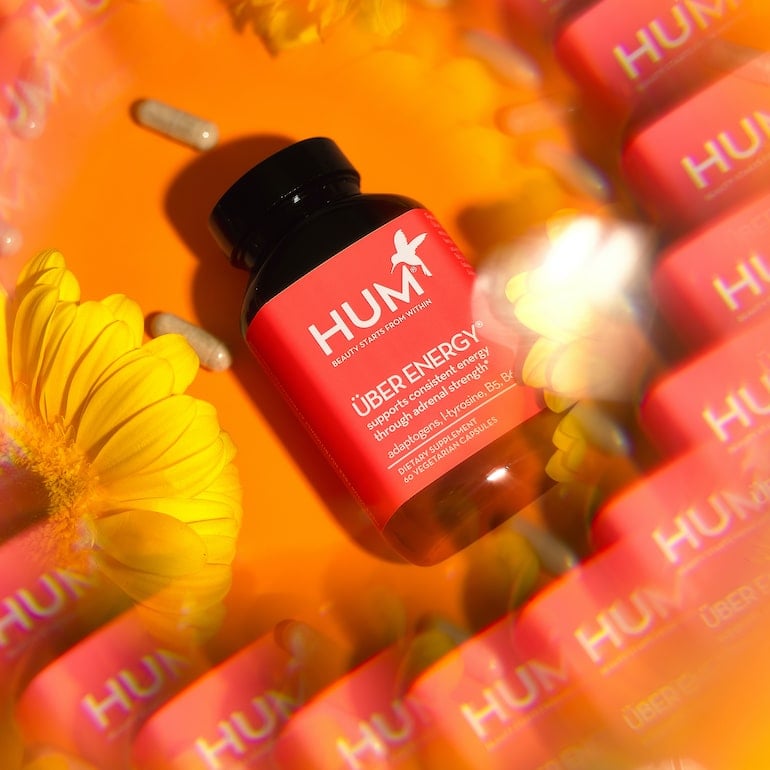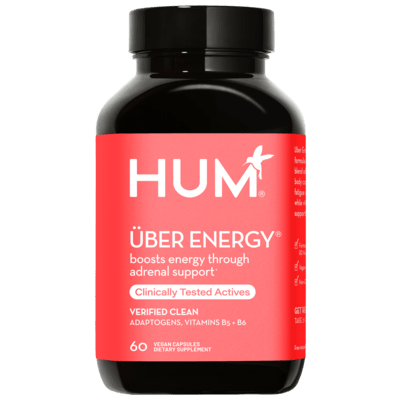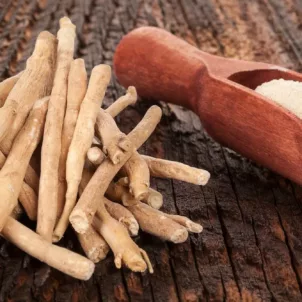The 5 Best Vitamins for Energy, According to a Dietitian
Is the mid-afternoon (or mid-morning, or post-lunch) slump getting you down? Always feel like a nap is calling your name? It’s a fast-paced world, and if you’re like most, you could use a little—or a lot—more energy throughout your day.
Before we look at the best vitamins and supplements for energy, we’ll first investigate a few common causes of low energy levels.
Causes of Low Energy
The causes of low energy levels varies, yet you may already be familiar with some of these habits that contribute to feelings of fatigue.
Caffeine Crashes
As far as your diet goes, drinking caffeinated beverages—especially on an empty stomach—may be a contributing factor to low energy.
Caffeine from beverages such as coffee can cause a rapid spike in energy and temporary mental sharpness. However, a crash often follows, which can leave you feeling worse than before you had your morning brew.

Low-Quality Sleep
Not getting enough sleep or getting only poor-quality sleep can also negatively impact energy levels. While it may seem obvious, sleep is a complex and vital component of health.
The body repairs itself by spending enough time in each stage of sleep. It’s also when your body combats the effects of stress you experienced that day. If you’re sleeping for short amounts of time or waking up throughout the night, your body can’t properly take care of itself. As a result, low-quality sleep can potential result with:- fatigue
- brain fog
- low productivity
Stress
Research shows that high levels of stress can drain your energy, too. Some believe that adrenal fatigue may be the culprit. (Note: Many major medical organizations don’t support this condition, as many of its symptoms overlap with other health issues.)
At any rate, stress-induced fatigue and lack of mental clarity are usually due to some combination of diet and lifestyle factors.
Fortunately, the herbs and supplements below are all meant to combat the negative effects these stressors have on mood and brain function.

What are the best vitamins for energy?
Here are some of the best vitamins, minerals, and herbs for energy that can also help you stay focused and productive.1. L-tyrosine
L-tyrosine is an amino acid (aka the building blocks of protein). Tyrosine is needed to create catecholamines, which are key components in energy production and stress management.
The production of serotonin and dopamine (neurotransmitters that affect your mood and energy levels) also requires tyrosine. Additionally, it’s needed to create epinephrine and norepinephrine, hormones involved in the body’s fight-or-flight stress response.
While studies in healthy human adults are limited, some suggest that you can increase L-tyrosine levels through diet. Plus, its benefits increase by consuming an L-tyrosine supplement with a protein-rich meal. That’s because the body can make tyrosine from phenylalanine, another amino acid naturally occurring in certain foods.
Lastly, L-tyrosine benefits include increased mental alertness and improved memory.
2. Rhodiola
Rhodiola rosea is a flowering plant that grows in Europe and Asia. It’s an adaptogen that can mediate the effects of stress by altering brain chemicals like serotonin, dopamine, and norepinephrine. It may help increase mental focus, as well.
A 2015 study shows that participants who took rhodiola for two weeks reported reductions in stress, anger, confusion, and low mood. Plus, a 2018 study suggests rhodiola can help prevent chronic stress and its complications.
Overall, the data favors the stress-reducing effects of rhodiola and proves it’s a powerful herb to promote mental health.
3. Ashwagandha
Ashwagandha is an adaptogenic herb; ingesting its roots can combat the effects of stress on the body. For instance, one study found that it can improve stress-related memory loss.
Then, a small but well-designed 2012 study shows that adults who take an ashwagandha supplement experience significant stress reduction versus a placebo group.
4. Eleuthero
Eleutherococcus senticosus (formerly known as Siberian ginseng) is another adaptogenic herb that demonstrates improved athletic performance and endurance in rats.
The main studies on this herb were performed decades ago in Siberia, but the data has since been reviewed many times. The data we do have suggests that eleuthero may help reduce inflammation and support adrenal health.
Note: While there’s conflicting evidence about the benefits of this herb, many who frequently use herbal remedies swear by it.

5. Vitamins B5 + B6
You may be familiar with the energy-promoting benefits of B vitamins, as you can often find them in a variety of energy drinks and supplements. That said, the best B vitamins for energy are B5 and B6, as they’re especially critical for energy production and stress management.
That’s because they’re key components in the body’s energy-producing and stress-managing pathways. Some evidence suggests that a vitamin B5 deficiency can compromise adrenal function and cause fatigue.
Conversely, supplementing with vitamin B5 can support the adrenals and help them respond more effectively to stress, thus maintaining healthy energy levels.
Then, the active form of vitamin B6 is important to create serotonin and dopamine. B6 is also necessary to create healthy red blood cells, which deliver oxygen to all parts of the body. Similar to B5, B6 is vital to create mood-regulating and stress-reducing chemicals in the brain.
The Bottom Line
Optimal energy levels can be hard to come by in the modern world. Many people turn to caffeine and sugar for short bursts of fuel throughout the day, but they can leave you feeling drained after the initial energy spike.
Fortunately, a combination of the right herbs, adaptogens, and vitamins for energy can optimize your body’s natural processes. It’s true that you can get these nutrients by eating a healthy, well-rounded diet. However, in situations of high stress and low energy, taking supplements with these vitamins can help your body out.
These herbs can help increase your energy, mental alertness, focus, and memory—as well as reduce stress—especially when combined with a balanced meal.
Note: Before you start a new supplement regimen, it’s always a good idea to speak with your healthcare provider for personalized recommendations.









